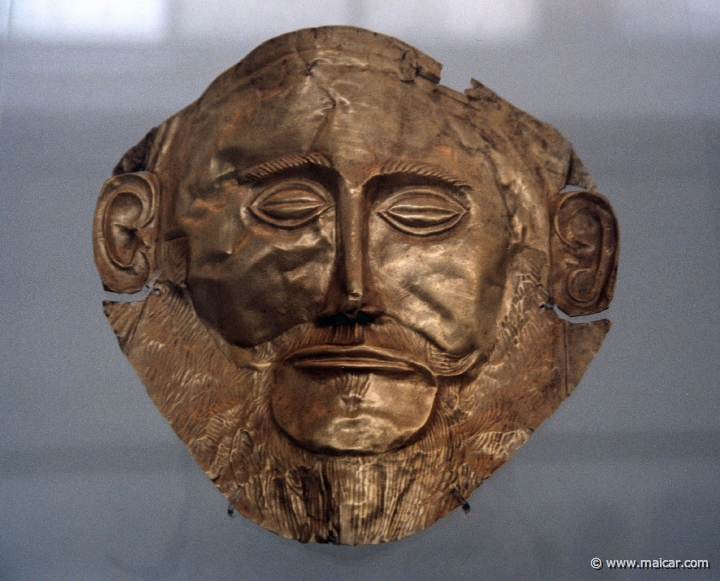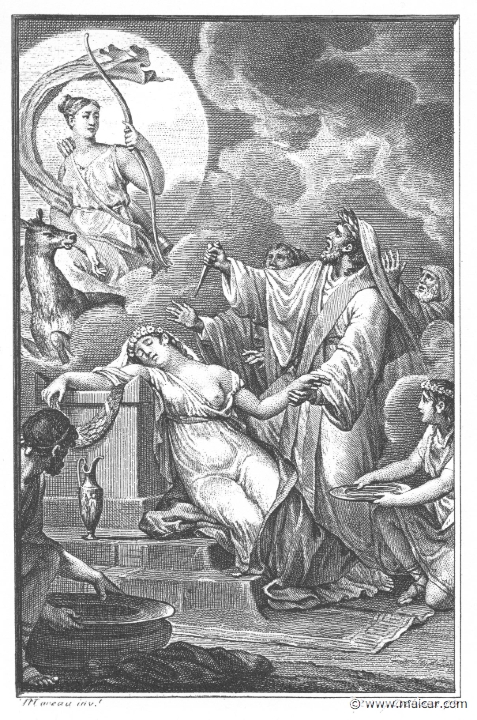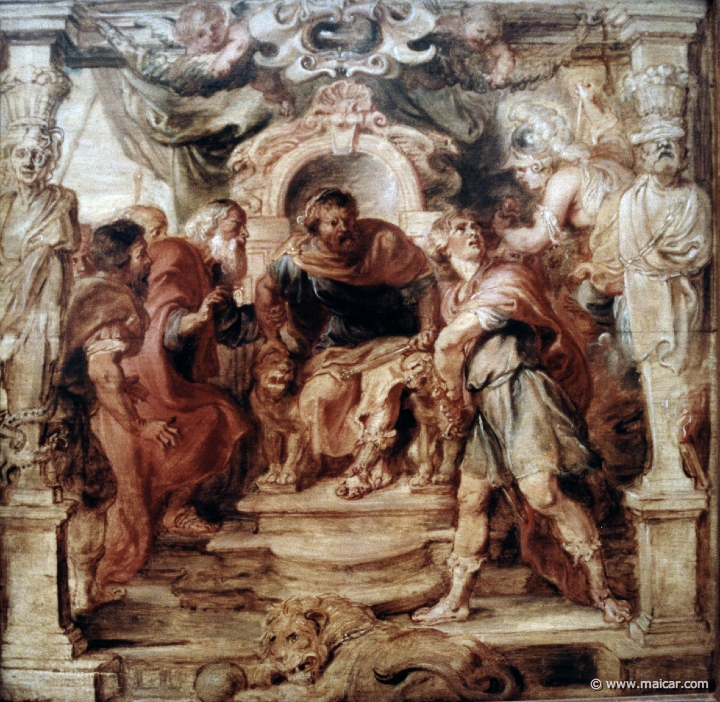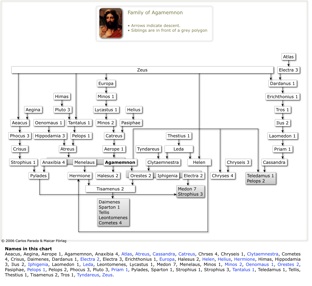 |
|
|

|
Mycenaean gold death-mask, called "Agamemnon". 6330: Gold death-mask, Schliemann's "Agamemnon". Finds from Shaft Grave V of Grave Circle A at Mycenae, 2nd half of the 16th century BC. National Archaeological Museum, Athens.
|
|
Agamemnon was king of Mycenae and commander in chief of the coalition that attacked Troy (for other leaders of the coalition see ACHAEAN LEADERS).
King Atreus of Mycenae, having a serious feud with his brother Thyestes 1, decided to arrest him. For this purpose he sent his sons, Agamemnon and Menelaus to seize Thyestes 1 in Delphi, and bring him to Mycenae. While Thyestes 1 was in prison, Atreus conspired to murder him but, having made false judgements, he was himself killed, and Thyestes 1 succeeded him on the throne. As a result, the Atrides (Atreus' sons) Agamemnon and Menelaus went into exile. At first they stayed with King Polyphides 1 of Sicyon, but later they were received in Aetolia by Oeneus 2, king of Calydon, and not long afterwards, when they thought the time was ripe to dethrone Mycenae's hostile ruler, they returned, and with the help of King Tyndareus of Sparta, they drove King Thyestes 1 away to Cythera, an island off the southern coast of the Peloponnesus. When they had thus seized power, the Atrides married the daughters of Tyndareus. Agamemnon married Clytaemnestra and became king of Mycenae, and Menelaus, having married Helen, became king of Sparta when Tyndareus died. However, Clytaemnestra, while still being a virgin, had already been given in marriage to Tantalus 3, son of Thyestes 1 or of Broteas 4, and was mother of a child. This is why Agamemnon could only marry her after killing her husband Tantalus 3 along with their child, a crime Clytaemnestra did not forget:
"By force, not of my will, did you wed me: you slew my husband and you dashed my living babe against the stones, from my breast with violence tearing him". (Clytaemnestra to Agamemnon. Euripides, Iphigenia in Aulis 1150).
And yet some have said that Tantalus 3 was killed as an infant by Atreus and served to Thyestes 1 at a banquet, and that his bones were kept in a vessel at Argos. In any case, the bloody tradition of Agamemnon's family is consistent with the Pythian priestess' words, that punishment also comes upon the descendants of the sinner (see Pelopides).
|
Retaliation demanded against Trojan theft
Some time later, Menelaus learned, while he was in Crete, that the Trojan seducer Paris had stolen his wife Helen and many treasures besides. As soon as he could, Menelaus met his brother Agamemnon at Mycenae, and together they decided to raise an army against Troy. Heralds then were sent to all kings of Hellas reminding them of "The Oath of Tyndareus" they had sworn, which bound them to support Menelaus if ever his marriage with Helen were threatened. This is how Agamemnon, who at the time was the most powerful ruler in Hellas, became the commander in chief of a large coalition, whose war ships gathered in Aulis—a Boeotian harbor opposite the island of Euboea—in order to sail to Troy and have Helen and the property restored, either through negotiation or by force.
Calchas' remedy against bad weather
However, the mighty fleet could not sail because of the winds, and as impatience grew in the army, the seer Calchas found the remedy to this inconvenience. He declared that they would be able to sail only if Agamemnon sacrificed his daughter Iphigenia to Artemis, and if he did, they would also take the city of Troy, but if he did not, they would neither sail nor sack the city. The seer assumed that Artemis wasArtemis was assumed to be angry at Agamemnon because he had said, on shooting a deer, that the goddess herself could not have done it better, and also because Agamemnon's father Atreus had not sacrificed to her a certain golden lamb (see Pelopides).
|

|
02121: Sacrifice of Iphigenia. "Just as Iphigenia was standing before the altar ready to shed her innocent blood, the goddess was moved to pity and spread a cloud before their eyes.." (Ov. Met. 12.30). Guillaume T. de Villenave, Les Métamorphoses d'Ovide (Paris, Didot 1806–07). Engravings after originals by Jean-Jacques François Le Barbier (1739–1826), Nicolas André Monsiau (1754–1837), and Jean-Michel Moreau (1741–1814).
|
|
Deceitful letter
Agamemnon is said to have thought of disbanding the army, for even if the ruler could accept the price, the father could not. But Menelaus, eager to be avenged and to have his own wife and property restored, persuaded his brother to become the murderer of his own daughter. So Agamemnon sent a deceitful letter to Clytaemnestra and their own child, asking them to come and join him in Aulis, where Iphigenia, he said, was going to be given in marriage to Achilles. Achilles himself was not aware of the way the king was using his name, for the lie was only known by Agamemnon, Menelaus, Calchas and Odysseus.
Agamemnon's raison d'état
Lured by the master of their own house, Clytaemnestra and Iphigenia came to Aulis, where murder, disguised as wedding, awaited the young girl. Some have said that this was a very serious dilemma that Agamemnon had to solve, for it is never easy to commit great crimes. Nevertheless the king prevailed over the father:
"Awful it is, my wife, to dare this deed, yet awful to forbear. I must do this!" (Agamemnon to Clytaemnestra. Iphigenia in Aulis 1255)
The ships sail, but the crime is remembered
Iphigenia was sacrificed and, if Calchas the seer is to be believed, the fleet could sail from Aulis to Troy thanks to that deed. But Clytaemnestra never forgave the loss of her daughter, and many years later, having killed her husband, she remembered the crime which justified her own:
"… for what Agamemnon did to my sweet flower, shoot sprung from him, Iphigenia, let him make no great boasts in the halls of Hades, since with death dealt him by the sword he has paid for what he first began." (Clytaemnestra. Aeschylus, Agamemnon 1525).
Iphigenia said to have survived the sacrifice
Yet it is also told that when Iphigenia was about to be sacrificed in Aulis, she vanished, being saved by Artemis, who substituted for her a deer at the altar and transported her to Tauris. Later, while being a priestess of Artemis in Tauris, Iphigenia saved her brother Orestes 2's life. Iphigenia, who has also been said to have been made immortal by the goddess, was not, according to some, the daughter of Agamemnon and Clytaemnestra, but of Theseus and Helen. They assert that, when Helen was restored to Sparta by the DIOSCURI, she took with her Iphigenia and gave her to Clytaemnestra to be brought up as the latter's daughter.
Humiliation of a pious man
In the tenth year of the Trojan War, Agamemnon captured Chryseis 3, daughter of Chryses 3, a priest of Apollo, and intended to keep the girl as a prize, take her home, and turn her into both a slave and a concubine. Chryses 3, a loving father if compared to the king, came then to see Agamemnon and, having blessed the whole army, offered a generous ransom for her daughter's freedom. The troops applauded the priest, but Agamemnon was not a man inclined to let his will be curbed. So he denied Chryses 3's request and, in an arrogant display of authority, threatened the old man, who left the Achaean camp humiliated.
Apollo's wrath
The best time to address the gods is when humans refuse to listen, so Chryses 3 prayed to Apollo as soon as he found himself alone. He asked the god to let the Achaeans pay through his golden arrows the tears he was shedding. That is why Apollo, who otherwise is known as the bright one, on hearing the prayer and learning the outrage his priest had suffered, came down from Olympus, as they say, darker than night, letting his arrows rain on the Achaean camp, which means that an epidemic spread in the army, taking many lives.
Calchas insulted and yet obeyed
As the plague was out of control, an assembly was called, in the course of which the seer Calchas declared that the reason for the pestilence was to be found in Apollo's anger, in turn caused by Agamemnon's insults. These were bad news for the king, who first called Calchas prophet of evil. Nevertheless he accepted to give up his beautiful prize, provided another fresh one was found to replace Chryseis 3. And if it couldn't be found, he said, he would help himself to someone else's prize.
Achilles raises his voice
|

|
Achilles considers killing the throned Agamemnon, who has just declared that he would take the former's sweetheart Briseis for himself. But while Achilles ponders, Athena comes from heaven and, invisible to the others, seizes him by his hair and stays his anger. To the left old Nestor watches the scene. 3926: Quarrel between Achilles and Agamemnon. Peter Paul Rubens 1577-1640: Achilles vertoornd op Agamemnon. Museum Boijmans van Beuningen, Rotterdam.
|
|
Because of this threat, Achilles called the king shameless schemer, and accused him of always taking the lion's share and using others to pile wealth and luxuries for himself. Then the king answered by letting Achilles know that, in the same way that Apollo was robbing him of the beautiful Chryseis 3, he was now going to pay a visit to Achilles' tent and, by taking away his sweetheart Briseis, teach him a lesson in power and kingship.
Agamemnon's art of ruling
Agamemnon kept his word: he gave up Chryseis 3 and took instead Achilles' sweetheart Briseis. Thereby he caused the best of his warriors to nurse a wrath which, keeping him away from the battlefield, caused the Achaean army as many losses as those caused by Apollo's plague. That's what Agamemnon's art of ruling achieved.
Offspring of Chryseis 3
When Chryseis 3 was set free, she gave birth to a son Chryses 4, who some say was son of Apollo but others call son of Agamemnon. On a later occasion, Chryses 4, as son of Agamemnon, saved the lives of Orestes 2 and Iphigenia in Tauris on account of their family ties, for these two were also children of Agamemnon.
Agamemnon at odds with Heaven
The conflict with Achilles put Agamemnon at odds with heaven, for the former was the son of a goddess, who obtained of Zeus the promise to teach Agamemnon and the Achaeans a lesson for the outrage her sweet son had suffered, by letting them, if only for a while, be routed by the Trojans. Agamemnon was also deceived by Zeus, who sent him false dreams carrying the message that victory was at hand and he should prepare to attack (see Oniros at Hypnos).
Agamemnon's appeasing gifts
It was not before the military situation had considerably deteriorated, that Agamemnon tried to appease Achilles' wrath so that he would fight again, by offering him the seven tripods, the seven women, the seven cities, and many other gifts which included Achilles' sweetheart Briseis, whom Agamemnon swore he had not touched—an oath that has never been openly questioned. But Achilles' considered these gifts hateful, for Menelaus' brother had done to him what Paris had done to Menelaus, and it was precisely this kind of outrage the Achaeans had come to avenge:
"Why has he gathered and led here his host, this son of Atreus? Was it not for Helen's sake? Do they then alone of mortal men love their wives, these sons of Atreus? No, for he who is a true man loves his own and cherishes her, as I too loved Briseis with all my heart." (Achilles to Agamemnon's envoys. Homer, Iliad 9.340).
War without Achilles
The fight then had to be done without Achilles. Agamemnon, himself a brave man, killed many Trojans. However, in spite of all efforts, the Achaeans got the worst part, and the king himself was wounded in battle by Coon, the eldest son of Antenor 1. But when the fire reached the ships, Achilles, fearing complete defeat, sent Patroclus 1 with a force of Myrmidons to fight. And when Hector 1 killed Patroclus 1 in battle, then Achilles came to life again.
Achilles puts his wrath aside
Achilles called an assembly of all Achaeans, and in it declared that his wrath was over. As a way of expressing how much he regretted his feud with Agamemnon, he even said that he wished Briseis to have been shot down by Artemis the day he chose her when he sacked Lyrnessus, the city east of Mount Ida. For he felt that because of his refusal to fight, Patroclus 1, whom he loved far more than Briseis, had been killed by Hector 1.
Agamemnon blames the gods for his blindness
On hearing this, Agamemnon declared that it had been wrong to confiscate Achilles' sweetheart, but he was not to blame, for surely it was Ate who had blinded his judgement, and every man knows that she is capable of deluding Zeus himself (see PERSONIFICATIONS). In any case, he acknowledged that since it was him who had been blinded, he was willing to make amends and pay compensation, referring again to the seven tripods, the seven women, the seven cities, and all other gifts that he formerly had offered Achilles.
Troy sacked
So ended the feud between Agamemnon and Achilles. Some have argued that Achilles is to blame, because his duty was to fight against the Trojans, not to spend a nice time in the company of sweet girls. Achilles never received Agamemnon's gifts, which meant nothing to him, for soon after he killed Hector 1, he was himself mortally wounded by Paris, who in turn was killed by the posioned arrow which Philoctetes discharged against him. It was the tenth year of the war, the bow and arrows of Heracles 1 were fighting on the Achaean side, Neoptolemus had arrived, and all other conditions to take the city had been fulfilled- So the WOODEN HORSE was conceived, and Troy was sacked.
Agamemnon and his concubine murdered
When Troy was taken, many Trojan women were made captives, and Cassandra was awarded to Agamemnon, who brought her as a concubine to Mycenae. But on his return, he and her new concubine were murdered by Aegisthus and Clytaemnestra, who had become lovers. Aegisthus became then king of Mycenae.
|
| Testimonies on the death of Agamemnon |
|
The death of Agamemnon was the result of a conspiracy set up during his absence by his own wife Clytaemnestra and her lover Aegisthus, who, after Agamemnon's death, ruled in Mycenae for seven years. But the circumstances of Agamemnon's death has been described differently:
According to Clytaemnestra she killed Agamemnon herself:
"… here is Agamemnon, my husband, now a corpse, the work of this right hand, a just workman. So stands the case." (Clytaemnestra. Aeschylus, Agamemnon 1405).
And again:
"… I stand where I dealt the blow; my purpose is achieved. Thus have I done the deed; deny it I will not." (Clytaemnestra. Aeschylus, Agamemnon 1379).
Apollo agrees with her when justifying Orestes 2's deed against his own mother:
"… as he [Agamemnon] was stepping from the bath, on its very edge, she [Clytaemnestra] threw a cloak like a tent over it, fettered her husband in an embroidered robe, and cut him down." (Apollo. Aeschylus, Eumenides 633).
When Odysseus descended to Hades, he met Agamemnon, who told him that he was killed at a banquet:
"… but Aegisthus wrought for me death and fate, and slew me with the aid of my accursed wife, when he had bidden me to his house and made me a feast, even as one slays an ox at the stall … and round about me the rest of my comrades were slain …" (Agamemnon's soul to Odysseus. Homer, Odyssey 11.409).
The traveller Pausanias agrees:
"… There is the grave of Atreus, along with the graves of such as returned with Agamemnon from Troy, and were murdered by Aegisthus after he had given them a banquet." (Pausanias 2.16.6.).
Others say:
"After Agamemnon had returned to Mycenae with Cassandra, he was murdered by Aegisthus and Clytaemnestra; for she gave him a shirt without sleeves and without a neck, and while he was putting it on he was cut down by Aegisthus." (Apollodorus, Library "Epitome" 6.23).
And still others:
"Clytaemnestra heard from Oeax, brother of Palamedes, that Cassandra was being brought as a concubine to her house, a false statement Oeax made in order to avenge the wrong done to his brother. Then Clytaemnestra, together with Aegisthus planned to kill Agamemnon and Cassandra. They killed him with an axe as he was sacrificing, and Cassandra, too." (Hyginus, Fabulae 117).
(Agamemnon had children with Cassandra, so perhaps the statement of Oeax was not that false.)
Electra 2 testifies:
"… how often I bewail my miserable father [Agamemnon], whom bloody Ares did not welcome with deadly gifts in a foreign land, but my mother and her bed fellow Aegisthus split his head with murderous axe, just as woodmen chop an oak." (Electra 2. Sophocles, Electra 94).
Orestes 2 claims:
"Together [Clytaemnestra and Aegisthus] they vowed a league of death against my unhappy father …" (Orestes 2. Aeschylus, Libation-Bearers 975).
A peasant said what is most commonly believed:
"… in his home died by his own wife Clytaemnestra's guile, and by Aegisthus' hand." (Peasant, nominal husband of Electra 2. Euripides, Electra 9).
Some say that these things happened because of the following:
When Nauplius 1 learned what happened to his son Palamedes, he sailed to the Achaeans, who were fighting at Troy, and claimed satisfaction for the death of his son. Not being able to obtain it, he traveled through the whole of Hellas and contrived for the wives of the Achaeans fighting at Troy to play their husbands false and sleep with lovers: Clytaemnestra with Aegisthus, Aegialia, wife of Diomedes 2, with Cometes 2, and Meda 2, wife of King Idomeneus 1 of Crete, with Leucus 1. But it is also told that, in Aegialia's case, it was Aphrodite who, for having been wounded by Diomedes 2, helped her to obtain many lovers.
|
| Family |
Parentage (three versions)
|
|
|
|
|
|
|
|
|
|
-
- Plisthenes 1 is himself said to be the son of Atreus & Aerope 1.
- Atreus is son of Pelops 1 and Hippodamia 3, the daughter of the cruel King Oenomaus 1 of Pisa, who used to kill his daughter's suitors.
- Aerope 1 is daughter of Catreus, son of King Minos 2 of Crete. She was in love with her husband's brother, Thyestes 1, whom she helped to produce the golden lamb which made him king of Mycenae (see Atreus and Pelopides).
- Catreus died at the time when Paris came to fetch Helen; for the absence of Menelaus from Sparta, which was so convenient for Paris' plans, is due to his voyage to Crete, where he came to attend the funerals of Catreus.
- Cleolla is daughter of Dias, otherwise unknown.
|
|
|
|
Clytaemnestra is daughter of King Tyndareus of Sparta & Leda.
Orestes 2 was Agamemnon's son and successor. So, his life being in danger while Aegisthus was king, Electra 2, his sister, smuggled him away and gave him to Strophius 1 to bring up. When Orestes 2 was grown up, he went to Delphi and asked the oracle whether he should take vengeance on his father's murderers. The god of the oracle gave him leave; so he departed secretly to Mycenae in the company of Pylades, son of Strophius 1, and killed both his mother and Aegisthus by the sword.
For this crime, however, he was pursued by the ERINYES, and afflicted with madness. Orestes 2 was brought to trial, but was acquitted. He also came to Tauris to get rid of his mental disorder and was made a prisoner there; but being recognized by his sister Iphigenia, who acted as a priestess, he fled, taking Iphigenia back to Hellas.
When Orestes 2 returned to his country, he became the ruler of a wide territory; for besides Mycenae and Argos, he extended his rule over the greater part of Arcadia, and succeeded to the throne of Sparta.
|
|
|
|
These children of Agamemnon were murdered by Aegisthus in Mycenae.
|

Chryseis 3
|
|
Chryseis 3 was captured and kept by Agamemnon, who refused to give her back to her father Chryses 3. Because of that, Apollo destroyed a large part of the Achaean army. Agamemnon finally restored her to her father, but then he took Briseis, Achilles' sweetheart, to replace the other girl. Achilles' wrath, caused by this outrage, was the reason of the heavy losses that the Achaean army suffered in the last year of the Trojan War.
When Orestes 2 and Iphigenia wished to leave Tauris (Crimea), they came to Chryses 4, and he, on account of their family ties, did not return them to King Thoas 3 of Tauris. Chryses 4 was informed by his grandfather Chryses 3 of his relation with the fugitives, though until then his mother had said that he was the son of Apollo, and not of Agamemnon. This Thoas 3 is the same who once was king of Lemnos, and was kept hidden by his daughter Hypsipyle, when the Lemnian women took over and killed all the men in the island (see also Lemnos, ARGONAUTS and, for the last time we meet Hypsipyle, see SEVEN AGAINST THEBES).
|
|
|
|
Halesus 2 allied himself with Turnus in Italy against the army of Aeneas. He was killed by Pallas 6, an ally of Aeneas and son of the Arcadian Evander 2 and Carmenta (for Evander 2, see Romulus).
|
|
|
|
|
|

|
Genealogical Charts
Names in this chart: Aeacus, Aegina, Aerope 1, Agamemnon, Anaxibia 4, Atlas, Atreus, Cassandra, Catreus, Chrses 4, Chryseis 1, Clytaemnestra, Cometes 4, Crisus, Daimenes, Dardanus 1, Electra 2, Electra 3, Erichthonius 1, Europa, Halesus 2, Helen, Helius, Hermione, Himas, Hippodamia 3, Ilus 2, Iphigenia, Laomedon 1, Leda, Leontomenes, Lycastus 1, Medon 7, Menelaus, Minos 1, Minos 2, Oenomaus 1, Orestes 2, Pasiphae, Pelops 1, Pelops 2, Phocus 3, Pluto 3, Priam 1, Pylades, Sparton 1, Strophius 1, Strophius 3, Tantalus 1, Teledamus 1, Tellis, Thestius 1, Tisamenus 2, Tros 1, Tyndareus, Zeus.
|
|
|
| Related sections |
Life and Deeds of the Pelopides, Trojan War, Map: ACHAEANS & TROJANS, Map: The Returns, Mycenae, TROJANS, Iphigenia, Orestes 2, Electra 2, Aegisthus, Clytaemnestra
Agamemnon in GROUPS: ACHAEAN LEADERS, ODYSSEUS IN HADES
|
|
|
Sources
Abbreviations |
Soph.Aj.passim; Aes.Aga.passim; Eur.IA.passim; Eur.Hec.passim; Apd.Ep.2.16, 3.12, 6.23; Apd.3.2.1, 3.10.6; Eur.Ore.17; Eur.IT.4; Eur.IA.29; Eur.Hel.390; QS.14.210; Hes.CWE.69; Hdt.1.67, 4.103; Hom.Il.passim; Hom.Od.11.387, 11.409; Eur.Ele.9; RET.1; Pau.2.16.6; Hyg.Fab.121; Vir.Aen.7.723.
|
|
|